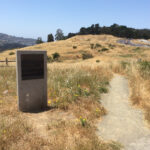Hector arrived first, a fugitive from the ‘meat wagon,’ journeying from the rain-washed coastal lands of Galway to the equally rain-soaked fields of North Devon. Small but perfectly formed, with delicate feet and luminescent dark eyes, he carried the obligatory cross on his back and an aura of spiritual significance inherent to all donkeys. Beautiful he was to behold, yet his braying was quite another matter. Positioned on Hartland headland, Hector could have served admirably as a foghorn.
It was this unpredictable braying, often lengthy and spontaneous, that unfortunately disqualified Hector from the coveted role of attendant-donkey-at-the-crib in the local church’s Nativity play. Adding to his woes were his equally unpredictable bodily functions, performed whenever and wherever the mood struck him. Hector was understandably displeased by this enforcement of health and safety regulations. His disappointment deepened when he was denied a part in a film celebrating the virtues and achievements of the Mare and Foal Sanctuary in Devon, of which I am privileged to be a patron.
To soothe Hector’s bruised theatrical ego, it was explained that the Sanctuary dedicates itself to rescuing horses and ponies from neglect, mistreatment, and disease, offering loving care to elderly and infirm equines in their final years. They excel in this mission, yet, to Hector’s dismay, donkeys are not mentioned in the Sanctuary’s manifesto. Donkeys, it was clarified, are under the care of the Donkey Sanctuary near Sidmouth, established by the admirable Elizabeth Svendson in 1969. Our film, however, was about horses, not donkeys, and thus, there was no role for Hector.
Now, my equine knowledge is admittedly limited, but my wife Cathy, an expert in such matters, suggested Hector was displaying signs of depression and melancholy. A companion, she proposed, might lift his spirits. A sound idea indeed. And so, we journeyed to Cornwall, to a run-down farm east of the imposing viaduct by Liskeard, traversed by the Cornish Riviera express en route to Penzance. There we found Hector’s potential soulmate, another Galway escapee. We coaxed and pushed the thin, reluctant creature into the van and transported him across the River Tamar to his new home. Perhaps, in retrospect, christening the newcomer ‘Achilles’ was somewhat ill-considered, given that in the Trojan War, Achilles and his Myrmidons famously slaughtered Hector and dragged his body ignominiously ‘at his horses tail in beastly sort’ across the battlefield.
However, no such deadly conflict ensued. Hector and Achilles forged an instant bond, becoming inseparable. They shared the stable and hay bag contentedly, strolling side-by-side and engaging in playful wrestling matches – a spectacle occasionally disrupted by Bruce, a spirited Springer Spaniel, a canine embodiment of Schopenhauerian philosophy. Bruce, ever eager to join the fray, failed to grasp that instead of merely barking at the combative duo, he risked becoming their snack!
Often, after these boisterous encounters, once Bruce had retreated to terrorize the neighborhood cats or harass the local birdlife, our two donkey companions would assume a still and (mercifully) silent vigil at the corner of the large outbuilding overlooking the paddocks. There they stood, steadfastly gazing eastward, come rain, hail, snow, or torrential downpour. This unwavering eastward gaze, offering no apparent material benefit and often in considerable discomfort, begs the question: why?
Now, twenty-five years portraying a TV detective hardly qualifies one as an expert in equine divinity. Nevertheless, I venture to suggest a reason for this behavior. I believe they are performing a silent act of remembrance, tapping into a race-memory inherent in all donkeys. They gaze towards a land far beyond our village of Pyworthy, towards the Sea of Galilee, recalling a distant Sunday when one of their ancestors enjoyed the singular honor of providing celebrity transport for the Messiah’s triumphant entry into Jerusalem. That donkey had his moment, the donkey’s hour, on that momentous day.
One far fierce hour and sweet
There was a shout about my ears
And palms before my feet
Perhaps their memory extends further. Legend has it that this same donkey, deeply devoted to Jesus, followed him on the Via Dolorosa from Jerusalem to Golgotha. It was there, as the sun dipped below the Hill of the Skull, that the shadow of the cross fell upon the donkey’s back – a mark that has remained on every donkey since, a badge of divine favor, a testament to Christ’s love, not just for one donkey, but for all donkeys, including Hector and Achilles.
And this, I believe, is what our pair commemorate, standing sentinel as they face the rising sun. If this interpretation holds true, and I am inclined to believe it does, then we can all rejoice for them – it is, without doubt, a profoundly satisfying state of affairs. I only wish a fraction of their gentle spirituality might permeate Bruce, but alas, he remains firmly tethered to earthly delights. Even now, he is likely attempting an improbable liaison with a living room cushion or chasing squirrels in the garden with undiminished, if futile, enthusiasm. Yet, Bruce too is a friend, just as Hector and Achilles are friends, who, in their youth, health, and loving environment, will hopefully live long after I have departed this earthly realm. And that, too, is a most satisfactory state of affairs.

